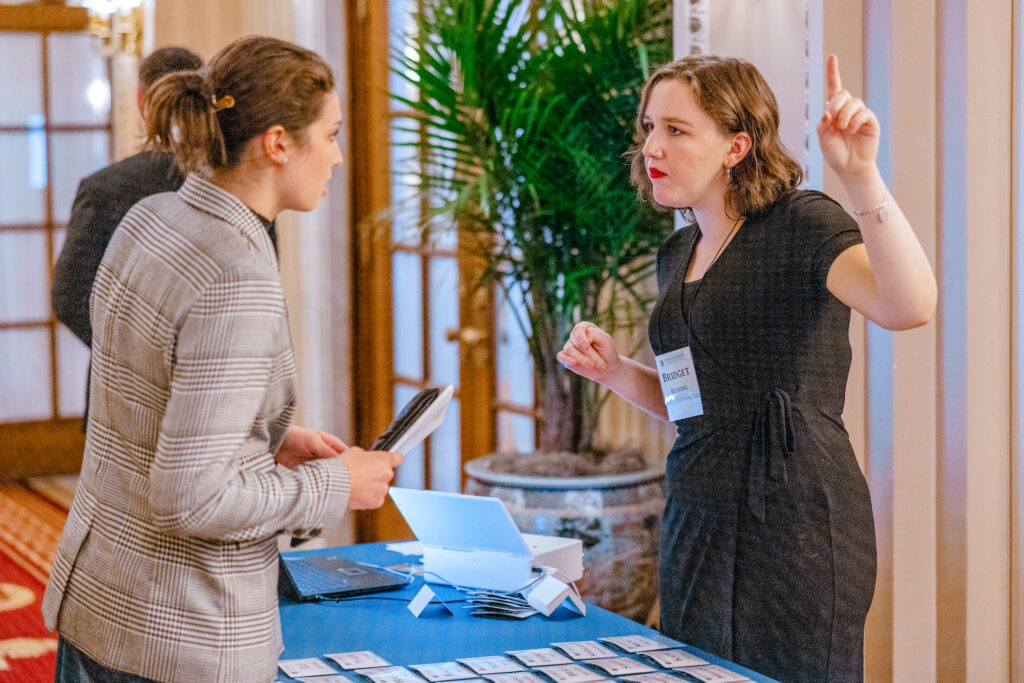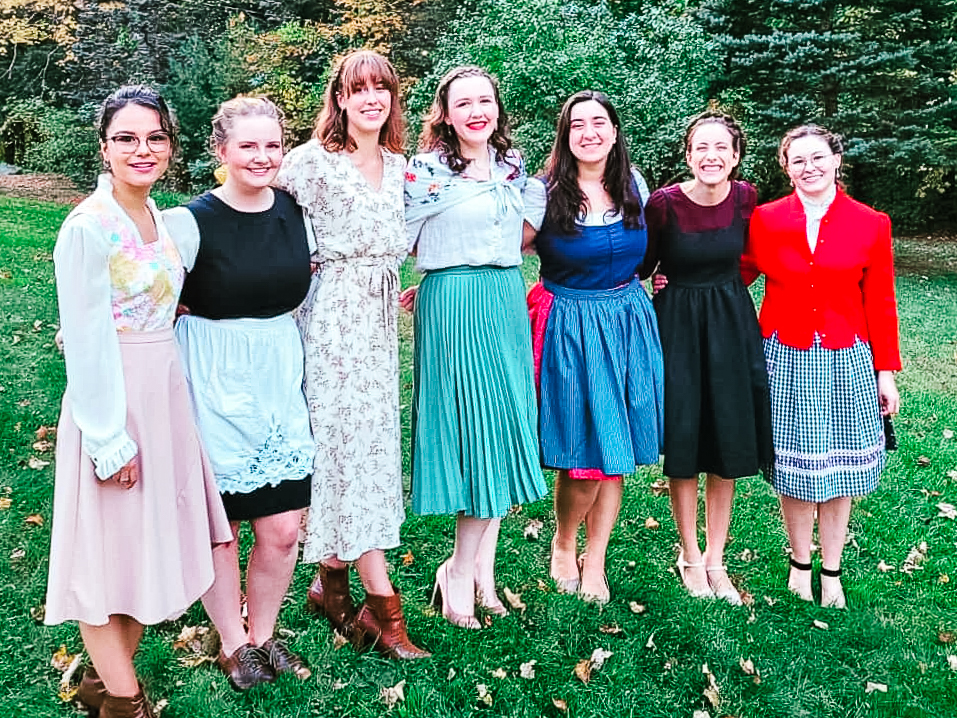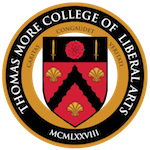By Cassandra Taylor, Publications Assistant

The Thomas More College curriculum focuses heavily on writing—a skill that, once developed, lends itself to infinite possibilities. For Bridget Ruffing ’22, putting her writing talents to good use has meant supporting conservative college journalism across the country. As a Program Officer at the Intercollegiate Studies Institute (ISI), Miss Ruffing supports the Collegiate Network, which boasts such prominent alumni as Supreme Court Justice Neil Gorsuch and New York Times columnist Ross Douthat.
Miss Ruffing took some time to tell us more about her position and what she has learned since graduating one year ago. She also offers some advice to TMC students who are interested in entering the nonprofit world after graduation.
What are your responsibilities in your role as an ISI Program Officer?
My work revolves around helping college students start and run campus newspapers. The mission of the Collegiate Network is to promote free speech and fruitful discourse on college campuses, so we do what we can to ensure that the papers in our network remain free to publish the truth, independent of school oversight and censorship. My schedule largely consists of meeting with our campus journalists both online and in-person, recruiting new journalists, building and maintaining websites for their publications, and planning yearly Collegiate Network conferences. I get to travel to lots of major cities for these meetings and conferences, which has been a great experience; I’ve seen so many new places in the past year alone.
I also help promote honest and skilled journalism in the media by matching promising young journalists with paid internship and fellowship roles at major news and opinion outlets, such as USA Today, First Things, National Review, and The American Conservative, among others. When I’m not overseeing these responsibilities, you’ll find me brainstorming ways to increase our outreach through marketing strategies, or helping with the other major events ISI hosts throughout the year—including a Viennese Waltz Ball in Washington, D.C.!

What was your favorite class at TMC? How did the College help nurture your love for writing?
It’s hard to pick just one, so I’m going to cheat a little bit and pick two. One favorite is a tutorial I took with Dr. Amy Fahey and Dr. Robert Royal called Apocalypses, Plagues, Utopias, and Dystopias. I discovered what are now some of my favorite works while taking this course, namely Albert Camus’s The Plague, Ralph Ellison’s Invisible Man, and T.S. Eliot’s The Waste Land. The discussions in this class were always fascinating and enriching; I loved diving deep into these works.
My other favorite is the class I took with the late Dr. Patrick Powers on Aristotle’s De Anima. This class was a challenge from the beginning, since De Anima is not an immediately accessible text, but my persistence in trying to understand what I was being taught eventually paid off. Working with Dr. Powers on the short papers he assigned during this class presented a valuable opportunity to dig at something I didn’t understand until I finally got it. And, once I did “get it,” I learned how to explain what I understood so that others could understand it too, using just the right analogies and no more words than absolutely necessary. This skill is incredibly valuable, and I use it all the time—whether I’m writing recruitment emails, creating marketing copy, or explaining how to fix a certain website problem.
These classes are just two examples of how my time at TMC taught me how to write effective prose and fostered my love for storytelling, poetry, images, and metaphor.
At TMC, you were a student writer for the College’s publications office. What “lessons learned” from that experience do you bring to your work today?
In the publications office, I learned the basics of how to navigate WordPress and optimize websites for functionality and beauty. Now I offer students looking to start a Collegiate Network publication a custom-built website, hosting, and tech support. I’ve had to learn a lot about how to build and fix websites on the job, but my work in publications laid a firm foundation that made the learning curve less steep.
My experience in publications also taught me the basics of social media marketing. I have since expanded that knowledge and can share it with students looking to increase readership and recruit new writers for their papers.
Finally, working as a writer in the publications office gave me an invaluable understanding of what the publishing process looks like from start to finish. I know first-hand what student editors and reporters are talking about when they discuss finding sources, conducting interviews, formatting articles, proofreading, and more.

What is the most important lesson you’ve learned in the past year since your graduation?
The most important lesson I’ve learned is that “wherever you go, there you are.” I expected that graduating college and starting a new job would be overwhelming, and, frankly, they have been. They’ve been wonderful, too. But it took me a few months of trying to ignore my overwhelm before I realized that I couldn’t distract myself from it forever. I couldn’t keep myself busy enough to outrun various insecurities and unanswered questions I had about who I am and where I’m going. I had to learn that new experiences don’t make you a completely new person. Everything may be different on the outside, but inside you’re still the same you, so the sooner you get to know who you are, and make peace with who you are, the sooner you can start truly enjoying life.
If I can offer any advice based on what I’ve learned, it’s this: take some time after graduating to get to know yourself, and work as hard as you can to accept and love who you are, especially in your moments of weakness, embarrassment, and small-mindedness. You’ll be better equipped to meet both the challenges and the joys of life if you do.
What advice would you give to TMC students who are interested in working in the non-profit sector?
I encourage you to seek out a non-profit with a mission that aligns with your values. In my experience, non-profit companies are extremely mission-oriented, so the more you appreciate the goal of your company, the more you will enjoy your work. I also encourage you to make the most of the opportunities your job presents you with. Working with ISI, I have had many fantastic opportunities to attend conferences and galas where I can meet new people and learn more about academia, journalism, and politics in the U.S.
That said, I also recommend that you take time to develop your own interests and hobbies. It’s good and healthy to spend time on pursuits that have nothing to do with your work or the mission of your company. It’s easy to lose yourself while pursuing your company’s mission. But, truly, you have so much to offer the world beyond what you do at work. As time allows, explore new places, dive deep into topics that interest you, read for pleasure, cultivate your own favorite hobbies, and make new friends.
For further reading:
Alumna Works to Defend the Family: An Interview with Emily LaFata, ’18
Finding Success after Graduation: An Interview with Dr. John Martin ’11
